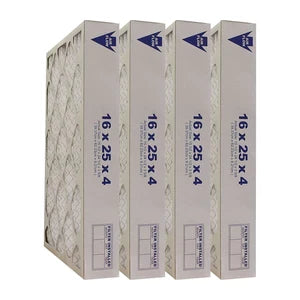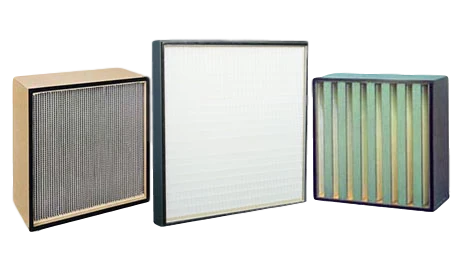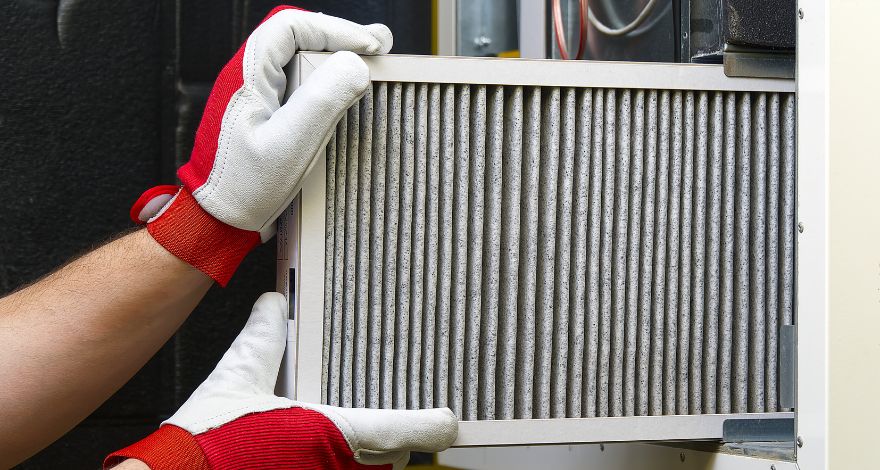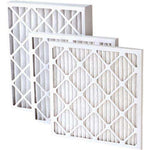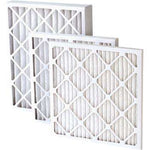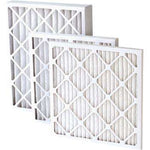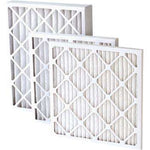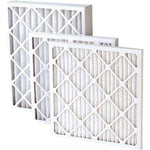Vous avez pas d'articles dans votre panier.
How Important Are Exact Furnace Filter Sizes? Here’s What You Should Know
Furnace filter sizes might not sound like a big deal until your HVAC system starts acting up or your energy bill spikes. If you’ve ever asked yourself, “Do furnace filters need to be the exact size?”, here’s the answer: absolutely.
A poor fit doesn’t just let dust sneak past. It messes with airflow, strains your system, and can shorten its lifespan.
This guide to filters for a furnace includes everything you need to know for improved IAQ and lower energy bills at the end of the month.
We’ll tell you why furnace filter sizes matter and what happens when you get it wrong.
You’ll find out how to tell if your filter is the right size, the difference between actual and nominal sizing, what to do with odd-size filters, and how the right fit can improve air quality, efficiency, and savings.
By the end, you’ll know exactly what to look for when it comes to furnace filter sizes (and what to avoid).

Why Furnace Filter Sizes Must Be Exact?
If your filter doesn’t fit exactly, your HVAC system can’t do its job properly.
We once had a customer wedge in a slightly smaller filter, thinking it wouldn’t matter. Well, it did. He later told us that his home got dustier, the system got louder, and it ended with a service call he could've avoided.
So, here’s what happens when you don’t consider furnace filter sizes and get something that is too small, too large, or not seated correctly.
-
Air bypasses the filter: If the filter doesn’t seal within the slot, dirty air flows around it instead of through it. That means dust, allergens, and debris go straight into your ducts and your lungs!
-
Dust buildup inside the system: Dirt accumulates on the blower motor, coils, and ductwork. This can lead to more frequent cleanings and expensive repairs.
-
Reduced energy efficiency: Poor airflow causes the system to work harder, using more energy to maintain your set temperature. That’s money out of your pocket every month.
-
Noisy operation and vibration: A filter that’s too loose can rattle or shift when the fan kicks on, causing annoying vibrations or even damage over time.
Bottom line: Even a half-inch off can cause problems. Always measure carefully and choose the exact size for your system. It saves you money, reduces maintenance, and keeps your home healthier.
Nominal vs. Actual Filter Size: What’s the Difference?
One of the most common mistakes homeowners make when buying a new filter is assuming the size printed on the packaging, which is the nominal size, is the actual size.
Spoiler: It isn’t! Here are the main differences between these furnace filter sizes.
-
Nominal Size: This is the rounded number on the filter label (e.g., 16x25x1). It’s a simplified way to categorize filter dimensions.
-
Actual Size: This is the filter’s true measurement (e.g., 15.5 x 24.5 x 0.75). It can vary slightly depending on the manufacturer.
That slight difference may seem harmless, but in HVAC systems, it can make or break a proper seal. For example, if your system needs a filter that measures 15-3/4 x 24-1/4 x 4-7/8 and you install one that’s 15-3/8 x 25-1/2 x 5-1/4, it won’t sit right.
You’ll end up with air leakage, poor filtration, and possibly damage to your system.
This is especially important with 5-inch filters for a furnace, which are notorious for having nearly identical nominal sizes but very different actual dimensions.
OEM brands like Honeywell, Carrier, and Air Bear each have their takes on what a standard furnace filter size, or "16x25x5" actually means.
-
Tip from the pros: Before buying a replacement, always double-check the actual dimensions printed on your old filter or measure it yourself.
Don’t assume two "16x25x5" filters will fit the same way. At UnitedFilter, we stock a wide range of furnace filter sizes to match the most common residential HVAC setups in Canada and the US.

Are All Filters for a Furnace the Same Size?
Are all furnace filters the same size? Not even close. Furnace filters come in dozens of shapes and dimensions, and even a half-inch difference can throw everything off.
Again, a filter that’s too small won’t seal properly, and one that’s too big simply won’t fit.
Many years ago, we had a customer send us a photo of their filter jammed halfway into the slot with duct tape holding it in place. It might’ve seemed like a quick fix, but it ended up blocking airflow and overworking the system.
If you're not sure which sizes of furnace filters you need, here’s how to figure it out:
-
Check the side of your current filter: The actual size is often printed along the edge.
-
Measure it yourself: Use a tape measure for height, width, and depth.
-
Look at your HVAC manual: It should list the exact filter size your unit requires.
Still stuck? Reach out to us. Call (905) 403-0160 or Toll Free: (844) 834-5837. We’re always happy to help confirm the right fit.
What to Do If You Have an Odd Size Furnace Filter?
Running into an unusual furnace filter size can be frustrating, especially when it feels like your only option is an overpriced OEM brand. We get it.
Some older HVAC units or brand-specific systems are built to use filters with unique measurements that don’t show up at your local hardware store.
But that doesn’t mean you’re stuck paying more.
Consider checking out our Canadian-made aftermarket filters designed to match many odd size furnace filters, including those tricky 5-inch models that OEMs tweak just enough to make shopping harder.
-
20x20x5 (actual size: 19-3/4 x 20 x 4-3/8)
-
20x25x5 (actual size: 19-3/4 x 24-1/4 x 4-7/8)

How to Choose the Right Furnace Filter Sizes and Types?
Choosing the right filter isn’t just about matching furnace filter sizes. Actually, it’s about finding the best balance between air quality, system performance, and long-term savings.
The filter material and MERV rating are just as important as the size printed on the label. Here’s what to consider.
Filters for a Furnace: Material Type
You can usually find furnace filters from these materials.
-
Fibreglass: This is the most affordable option. They’re thin, disposable, and capture only larger particles, like lint and dust. However, we don’t recommend it if you have allergies or pets.
-
Pleated synthetic media: A higher-efficiency option that traps finer particles, such as mould spores, pet dander, and pollen. These filters are more durable and offer better airflow control.
-
Electrostatically charged filters: These furnace filters use static electricity to attract airborne particles. We recommend them for homes with pets or people sensitive to allergens.
Filters for a Furnace and MERV Ratings: What Do They Mean?
In short, MERV stands for Minimum Efficiency Reporting Value. It’s a standardized rating system that ranges from 1 to 16 and measures a filter’s ability to trap airborne particles. Residential furnace filters typically fall between MERV 8 and MERV 13.
-
MERV 8: Captures particles like dust, lint, and pollen. Suitable for homes without pets or allergy concerns.
-
MERV 11: MERV 11 furnace filters can capture smaller particles, like pet dander, mould spores, and smoke. It’s a great all-purpose filter that doesn’t overly restrict airflow.
-
MERV 13: Offers excellent filtration, catching bacteria, viruses, smoke, and fine dust. We recommend it for homes with allergies, asthma, or health concerns.
Did you know? According to the Environmental Protection Agency, filters with a MERV rating of 13 or higher can significantly improve indoor air quality by reducing airborne contaminants and pathogens.

Do the Right Furnace Filter Sizes Help You Save Money?
Yes. When you choose wisely, a good furnace filter can save you money in the long run.
As we’ve mentioned before, a well-fitting, high-quality filter allows air to flow freely through your HVAC system. When airflow isn’t restricted, your system doesn’t have to work as hard to heat or cool your home. Also expect:
-
Fewer repairs: Clean filters prevent dust and debris from building up inside your equipment. That reduces wear on parts like the blower motor and coils, helping your system run smoothly for years without major breakdowns.
-
Less frequent maintenance: With the right MERV rating and filter material, you’ll capture more dust and allergens before they enter your ducts. That means fewer cleanings and less need for technician visits.
And if you're shopping smart, the savings get even better. Buying furnace filters on sale or in multi-packs, like our UF11-11620-12 (a 12-pack of MERV 11 filters). Plus, stocking up means you're always prepared when it’s time for a change.
Think of it this way: spending a little more upfront on good filters pays off in lower bills, less stress, and a healthier HVAC system.
Furnace Filters in Canada: Why Accurate Furnace Filter Sizes Matter Even More
If you live in Canada, you know that winters can be tough, and the furnace usually has to work hard. That means your air filter in Canada plays a bigger role in performance and indoor comfort.
Getting the right sizes of furnace filters and quality matters because:
-
Canadian homes are sealed tightly, making air quality more dependent on filtration
-
Return shipping is more costly across provinces
-
Air filters in Canada need to handle heavy seasonal dust, pet hair, and allergens

Conclusion: Do Furnace Filter Sizes Need to Be Accurate?
In summary: yes, they do.
Furnace filter sizes aren’t just a technical detail: they affect how well your HVAC system runs, how clean your air is, and how much you’ll spend on energy and maintenance.
Filters for a furnace need to fit exactly to seal properly, trap airborne particles, and keep your system running efficiently.
Don’t fall into the “close enough” mindset. Even a small gap can lead to poor filtration, airflow problems, and unnecessary wear on your equipment.
At UnitedFilter, we carry the standard furnace filter size and odd-size filters for homes across Canada and the US. We focus on quality, fit, and value so you get good furnace filters that work, without the OEM markup.
Are you ready for improved indoor air quality and a more comfortable living environment with the best air filters for furnace? Order high-quality furnace filters on sale in Canada today!
How Important Are Exact Furnace Filter Sizes? Here’s What You Should Know
Furnace filter sizes might not sound like a big deal until your HVAC system starts acting up or your energy bill spikes. If you’ve ever asked yourself, “Do furnace filters need to be the exact size?”, here’s the answer: absolutely.
A poor fit doesn’t just let dust sneak past. It messes with airflow, strains your system, and can shorten its lifespan.
This guide to filters for a furnace includes everything you need to know for improved IAQ and lower energy bills at the end of the month.
We’ll tell you why furnace filter sizes matter and what happens when you get it wrong.
You’ll find out how to tell if your filter is the right size, the difference between actual and nominal sizing, what to do with odd-size filters, and how the right fit can improve air quality, efficiency, and savings.
By the end, you’ll know exactly what to look for when it comes to furnace filter sizes (and what to avoid).

Why Furnace Filter Sizes Must Be Exact?
If your filter doesn’t fit exactly, your HVAC system can’t do its job properly.
We once had a customer wedge in a slightly smaller filter, thinking it wouldn’t matter. Well, it did. He later told us that his home got dustier, the system got louder, and it ended with a service call he could've avoided.
So, here’s what happens when you don’t consider furnace filter sizes and get something that is too small, too large, or not seated correctly.
-
Air bypasses the filter: If the filter doesn’t seal within the slot, dirty air flows around it instead of through it. That means dust, allergens, and debris go straight into your ducts and your lungs!
-
Dust buildup inside the system: Dirt accumulates on the blower motor, coils, and ductwork. This can lead to more frequent cleanings and expensive repairs.
-
Reduced energy efficiency: Poor airflow causes the system to work harder, using more energy to maintain your set temperature. That’s money out of your pocket every month.
-
Noisy operation and vibration: A filter that’s too loose can rattle or shift when the fan kicks on, causing annoying vibrations or even damage over time.
Bottom line: Even a half-inch off can cause problems. Always measure carefully and choose the exact size for your system. It saves you money, reduces maintenance, and keeps your home healthier.
Nominal vs. Actual Filter Size: What’s the Difference?
One of the most common mistakes homeowners make when buying a new filter is assuming the size printed on the packaging, which is the nominal size, is the actual size.
Spoiler: It isn’t! Here are the main differences between these furnace filter sizes.
-
Nominal Size: This is the rounded number on the filter label (e.g., 16x25x1). It’s a simplified way to categorize filter dimensions.
-
Actual Size: This is the filter’s true measurement (e.g., 15.5 x 24.5 x 0.75). It can vary slightly depending on the manufacturer.
That slight difference may seem harmless, but in HVAC systems, it can make or break a proper seal. For example, if your system needs a filter that measures 15-3/4 x 24-1/4 x 4-7/8 and you install one that’s 15-3/8 x 25-1/2 x 5-1/4, it won’t sit right.
You’ll end up with air leakage, poor filtration, and possibly damage to your system.
This is especially important with 5-inch filters for a furnace, which are notorious for having nearly identical nominal sizes but very different actual dimensions.
OEM brands like Honeywell, Carrier, and Air Bear each have their takes on what a standard furnace filter size, or "16x25x5" actually means.
-
Tip from the pros: Before buying a replacement, always double-check the actual dimensions printed on your old filter or measure it yourself.
Don’t assume two "16x25x5" filters will fit the same way. At UnitedFilter, we stock a wide range of furnace filter sizes to match the most common residential HVAC setups in Canada and the US.

Are All Filters for a Furnace the Same Size?
Are all furnace filters the same size? Not even close. Furnace filters come in dozens of shapes and dimensions, and even a half-inch difference can throw everything off.
Again, a filter that’s too small won’t seal properly, and one that’s too big simply won’t fit.
Many years ago, we had a customer send us a photo of their filter jammed halfway into the slot with duct tape holding it in place. It might’ve seemed like a quick fix, but it ended up blocking airflow and overworking the system.
If you're not sure which sizes of furnace filters you need, here’s how to figure it out:
-
Check the side of your current filter: The actual size is often printed along the edge.
-
Measure it yourself: Use a tape measure for height, width, and depth.
-
Look at your HVAC manual: It should list the exact filter size your unit requires.
Still stuck? Reach out to us. Call (905) 403-0160 or Toll Free: (844) 834-5837. We’re always happy to help confirm the right fit.
What to Do If You Have an Odd Size Furnace Filter?
Running into an unusual furnace filter size can be frustrating, especially when it feels like your only option is an overpriced OEM brand. We get it.
Some older HVAC units or brand-specific systems are built to use filters with unique measurements that don’t show up at your local hardware store.
But that doesn’t mean you’re stuck paying more.
Consider checking out our Canadian-made aftermarket filters designed to match many odd size furnace filters, including those tricky 5-inch models that OEMs tweak just enough to make shopping harder.
-
20x20x5 (actual size: 19-3/4 x 20 x 4-3/8)
-
20x25x5 (actual size: 19-3/4 x 24-1/4 x 4-7/8)

How to Choose the Right Furnace Filter Sizes and Types?
Choosing the right filter isn’t just about matching furnace filter sizes. Actually, it’s about finding the best balance between air quality, system performance, and long-term savings.
The filter material and MERV rating are just as important as the size printed on the label. Here’s what to consider.
Filters for a Furnace: Material Type
You can usually find furnace filters from these materials.
-
Fibreglass: This is the most affordable option. They’re thin, disposable, and capture only larger particles, like lint and dust. However, we don’t recommend it if you have allergies or pets.
-
Pleated synthetic media: A higher-efficiency option that traps finer particles, such as mould spores, pet dander, and pollen. These filters are more durable and offer better airflow control.
-
Electrostatically charged filters: These furnace filters use static electricity to attract airborne particles. We recommend them for homes with pets or people sensitive to allergens.
Filters for a Furnace and MERV Ratings: What Do They Mean?
In short, MERV stands for Minimum Efficiency Reporting Value. It’s a standardized rating system that ranges from 1 to 16 and measures a filter’s ability to trap airborne particles. Residential furnace filters typically fall between MERV 8 and MERV 13.
-
MERV 8: Captures particles like dust, lint, and pollen. Suitable for homes without pets or allergy concerns.
-
MERV 11: MERV 11 furnace filters can capture smaller particles, like pet dander, mould spores, and smoke. It’s a great all-purpose filter that doesn’t overly restrict airflow.
-
MERV 13: Offers excellent filtration, catching bacteria, viruses, smoke, and fine dust. We recommend it for homes with allergies, asthma, or health concerns.
Did you know? According to the Environmental Protection Agency, filters with a MERV rating of 13 or higher can significantly improve indoor air quality by reducing airborne contaminants and pathogens.

Do the Right Furnace Filter Sizes Help You Save Money?
Yes. When you choose wisely, a good furnace filter can save you money in the long run.
As we’ve mentioned before, a well-fitting, high-quality filter allows air to flow freely through your HVAC system. When airflow isn’t restricted, your system doesn’t have to work as hard to heat or cool your home. Also expect:
-
Fewer repairs: Clean filters prevent dust and debris from building up inside your equipment. That reduces wear on parts like the blower motor and coils, helping your system run smoothly for years without major breakdowns.
-
Less frequent maintenance: With the right MERV rating and filter material, you’ll capture more dust and allergens before they enter your ducts. That means fewer cleanings and less need for technician visits.
And if you're shopping smart, the savings get even better. Buying furnace filters on sale or in multi-packs, like our UF11-11620-12 (a 12-pack of MERV 11 filters). Plus, stocking up means you're always prepared when it’s time for a change.
Think of it this way: spending a little more upfront on good filters pays off in lower bills, less stress, and a healthier HVAC system.
Furnace Filters in Canada: Why Accurate Furnace Filter Sizes Matter Even More
If you live in Canada, you know that winters can be tough, and the furnace usually has to work hard. That means your air filter in Canada plays a bigger role in performance and indoor comfort.
Getting the right sizes of furnace filters and quality matters because:
-
Canadian homes are sealed tightly, making air quality more dependent on filtration
-
Return shipping is more costly across provinces
-
Air filters in Canada need to handle heavy seasonal dust, pet hair, and allergens

Conclusion: Do Furnace Filter Sizes Need to Be Accurate?
In summary: yes, they do.
Furnace filter sizes aren’t just a technical detail: they affect how well your HVAC system runs, how clean your air is, and how much you’ll spend on energy and maintenance.
Filters for a furnace need to fit exactly to seal properly, trap airborne particles, and keep your system running efficiently.
Don’t fall into the “close enough” mindset. Even a small gap can lead to poor filtration, airflow problems, and unnecessary wear on your equipment.
At UnitedFilter, we carry the standard furnace filter size and odd-size filters for homes across Canada and the US. We focus on quality, fit, and value so you get good furnace filters that work, without the OEM markup.
Are you ready for improved indoor air quality and a more comfortable living environment with the best air filters for furnace? Order high-quality furnace filters on sale in Canada today!
